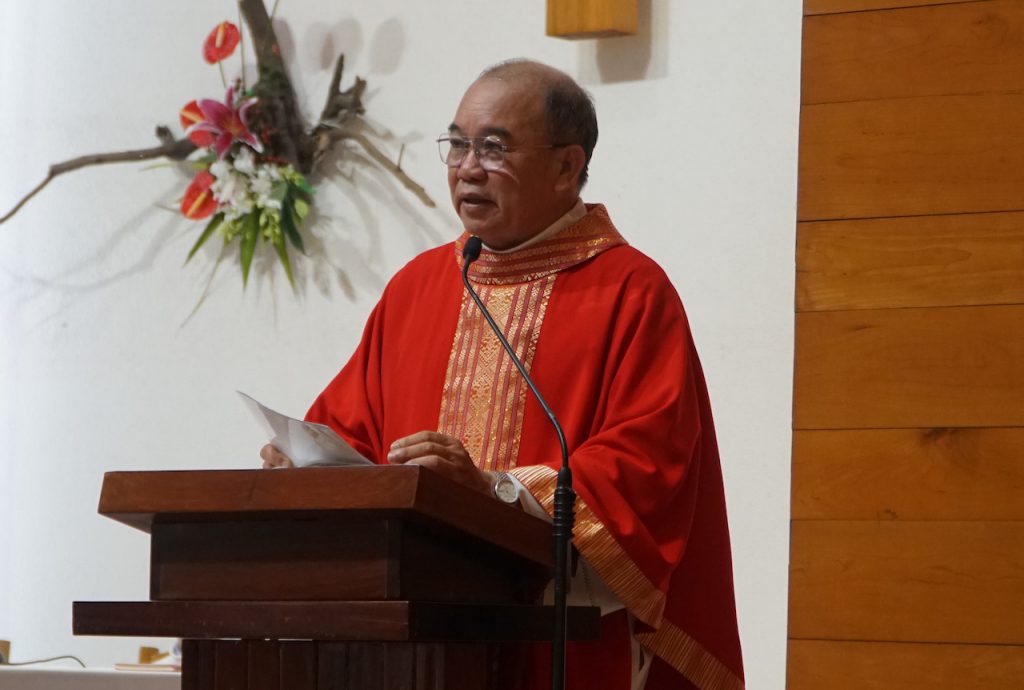
Homily of Fr. Provincial at the Perpetual First Vows (31 May 2020)

Vincent Pham Van Mam, SJ
Provincial Superior
Translated by Chinh Tran, SJ
Pentecost: the Graduation Day of Apostles
Dear brothers and sisters!
The Gospel of the feast of Pentecost today tells us that after his resurrection, Jesus is recorded as appearing many times to his apostles to give them peace and the Holy Spirit. By saying “As the Father has sent me, so I send you,” (Jn 20:21) Jesus affirms that it is only by the power of the Holy Spirit that the apostles can truly “graduate” from “the school of Jesus” and fulfill their mission as witnesses of the Risen Lord.
Today is also the first vows Mass of 13 Jesuit novices who have finished two years at the novitiate for the first stage of Jesuit formation. We pray for them so that they might love their vocations and wisely use graces of God to be the Lord’s witnesses in the school of life.
Lessons They Fail to Learn
Many of us used to have the experience of failing in exams. This was also the experience of the apostles when they followed the so-called “Jesus school of formation.” As Jesus’ disciples, their minds and hearts were illuminated by their Master so that they would be freed from darkness and ignorance, which covered their perspectives from the reality of the Kingdom of God. However, they had eyes but failed to see, and ears but failed to hear (Mk 8:18) or heard but failed to understand (Mk 4:12). Jesus taught them essential lessons to continue to accomplish his mission, but they failed to learn.
Indeed, Jesus taught them how to pray and advised them to pray always (Lk 18:1-8). Unfortunately, they all failed in reality: “Why are you sleeping? Get up and pray that you may not undergo the test.” (Lk 22: 40, 46)
Jesus taught them to be good servant leaders as he was: “I am among you as the one who serves.” (Lk 22:27). However, in fact, they still wanted power and glory for themselves, and the use of power to dominate over others: “Then an argument broke out among them about which of them should be regarded as the greatest.” (Lk 22:24). They were willing to use violence as a last resort: “Lord, do you want us to call down fire from heaven to consume them?” (Lk 9:54-55)
After following Jesus for a long time, Peter appeared mature when he recognized and proclaimed Jesus to be Christ. Nevertheless, Peter’s awareness of “the Christ of God” was insufficient because he didn’t want to accept the “kenosis,” “the Son of Man must suffer greatly and be rejected by the elders, the chief priests, and the scribes, and be killed, and rise after three days.” (Mk 8:31) Peter didn’t want to engage in the fate of Jesus when he took Jesus aside and rebuked him. (v. 32) Here, he received “a failing grade,” “Get behind me, Satan. You are thinking not as God does, but as human beings do.” (v. 33) Similarly, other apostles failed to understand what Jesus was talking about: “They did not understand the saying, and they were afraid to question him.” (Mk 9:32) They were not able to understand because they had not been given the Holy Spirit yet.
Pentecost: The Graduation Day of Apostles
According to the book of Acts, when the day of Pentecost came, “they were all together (including the Eleventh, Mother of Jesus) in one place. All of them were filled with the Holy Spirit. The apostles were changed radically. They understood all lessons that Jesus taught them before and integrated them into their lives.
They knew how to pray and seek God’s will with regards to their important decision, such as the choosing of Mathias to replace Judas Iscariot: “You, Lord, who know the hearts of all, show which one of these two you have chosen.” (Acts 1:24) They constantly prayed when they are persecuted and encouraged Christian communities in the midst of trials. (Acts 2:42-47; 4: 23-31)
On the day of Pentecost, the apostles already understood the most challenging lesson of discipleship formation. This was the lesson of humility and self-emptying. (Pl 2:6-11) Filled with the seven gifts of the Holy Spirit, they fully saw, heard, and understood the teachings of Jesus and willingly became witnesses of the Gospel. They were “rejoicing that they had been found worthy to suffer dishonor for the sake of the name.” (Acts 5:41) This never happened before.
Peter, after Pentecost, was described by the Arts of the Apostoles as a model apostle after receiving the Holy Spirit. Previously, he rebuked his Master for choosing the way of suffering. But now, he was publically proclaiming to a large audience in Jerusalem the life and resurrection of Jesus. He helped them to recognize Jesus, “whom they crucified but whom God raised from the dead” and glorified him, the Christ of God.
When three times Jesus foretold his death and resurrection, the disciples were fearful and failed to understand or to respond appropriately. Now, when the Holy Spirit was poured out at Pentecost, they were overwhelmed with joy, rejoicing that they had been found worthy to suffer dishonor for the sake of the name. They were convinced that “nothing can ever separate us from God’s love in Jesus Christ our Lord” (Rm 8:38-39) and that “as long as in every way… Christ is being proclaimed,” they “shall continue to rejoice.” (Pl 1:18) Jesus became their way of life as St. Paul said: “For me, life is Christ.” (Pl 1:21) Indeed, the Holy Spirit of the Risen Lord was given to the apostles to guide them “to all truth.” (Jn 16:13) And they had obtained an inner integration in their vocations and missions. Probably, the day of Pentecost might be called “the Graduation Day of the Apostles.”
Following Christ, Who Was Carrying the Cross
Today, thirteen Jesuit novices will profess first vows of poverty, chastity, and obedience in the Society of Jesus to totally dedicate their lives to God and to radically follow Jesus’ footsteps. Like St. Ignatius and his first companions, they desire to follow Christ, who carried the Cross to serve God’s glory and the happiness of others. Following Jesus Christ, who carried the Cross, imitating the mystery of the kenosis of Christ, and practicing the vows of poverty, chastity, and obedience for apostolic purpose are characteristics of the Jesuits. These characteristics make “the core” of a “kit set” to evaluate the depth of a Jesuit as well as to recognize his Jesuit identity.
During two years of the novitiate, these young men already experienced tensions like Peter and other apostles: they enjoyed the happiness of being called to serve the Lord, yet at the same time they experienced the darkness of being selfish; they were aware of the preciousness of mission, yet at the same time they were attracted to worldly values. There was an ongoing battle between flesh and spirit within their hearts: sometimes they chose to side with the Lord, and sometimes they took side with evil.
Becoming more aware of these tensions and desiring to follow Jesus who carried the Cross, through their profession of vows, these young men share the same sentiment with Peter: “Lord, you know everything; you know that I love you.” (Jn 21:17) By opening his heart to be loved by the Lord and to love the Lord, Peter had graduated from his Master’s school: “Follow me.” Thirteen novices, who will profess their vows today, also desire the same graduation in their journey of being conformed to the image of Christ, who loves and calls them.
We share in the joy and happiness of our brothers in this blessed occasion and ask for the Holy Spirit of the Risen Lord to come and accomplish God’s work in their lives.
Recent Posts
-
 Networking in vocation promotion2 months/0 Comments
Networking in vocation promotion2 months/0 Comments -

-

-









